The Wall Street Journal asked me to write a special “Sightings” column about the James Levine scandal and its possible short- and long-term effects on the Metropolitan Opera. Here’s an excerpt.
* * *
“Everybody knew.” That’s what they said about Harvey Weinstein, and that’s what they’re saying now about James Levine—but can it be true? Not in the narrowly legal sense. As of today, nobody “knows” anything about the alleged transgressions of the Metropolitan Opera’s music director emeritus beyond the indisputable fact that, as the New York Times has reported, four men have publicly accused him of abusing them sexually many years ago when they were teenagers….
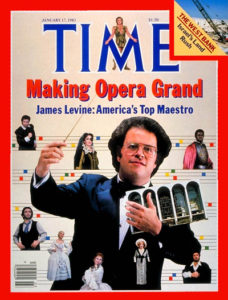 Yet it is no less indisputable that rumors that Mr. Levine is a pedophile have circulated for the whole of my adult life. I first heard them in Kansas City in the ’70s. I have yet to meet anyone in the world of opera who was unaware of these rumors….
Yet it is no less indisputable that rumors that Mr. Levine is a pedophile have circulated for the whole of my adult life. I first heard them in Kansas City in the ’70s. I have yet to meet anyone in the world of opera who was unaware of these rumors….
The Times reported over the weekend that a spokesman for Mr. Levine had no comment on the specific allegations that have now emerged, and that he has twice denied to Met executives, in 1979 and a year ago, any sexual misconduct. But the company is taking the charges seriously enough to have suspended its relationship with the conductor, who served as its music director from 1976 to 2016. Over the weekend, Peter Gelb, the Met’s general manager, canceled all of Mr. Levine’s scheduled performances and commissioned Proskauer Rose, an outside law firm, to conduct an investigation.
It is impossible to overstate the significance of these developments. In a very real sense, James Levine is the Met. He is the public figure most closely associated with the company, the one who has been central to its fortunes for more than four decades, and the first truly great artist to be swept up in the current maelstrom of sexual-harassment accusations. If it is proved that he did what his accusers claim, there can be no doubt that his extraordinary career will come at once to a shameful end.
Beyond that, much will hang on whether Proskauer Rose’s investigation proves that “everybody”—that is, those inside the Met—did in fact know about Mr. Levine. For this is no ordinary scandal: It is an existential crisis, one that threatens the survival of a financially beleaguered organization that had already spent years struggling with the problem of Mr. Levine’s declining health….
* * *
Read the whole thing here.
James Levine leads the Metropolitan Opera Orchestra in a performance of the overture to Mozart’s Magic Flute:




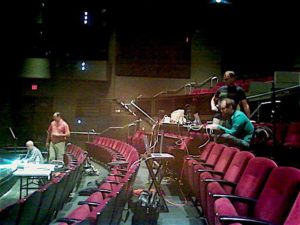 “Actors, take your official five, so that we can start at the top and work without stopping,” Debi Marcucci, the omnipotent stage manager and assistant director of
“Actors, take your official five, so that we can start at the top and work without stopping,” Debi Marcucci, the omnipotent stage manager and assistant director of 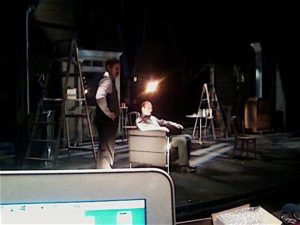 As I
As I 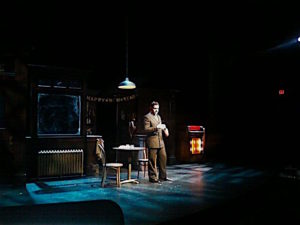 It was through watching Gordon’s tech rehearsals that I took the first step on the unexpectedly short road that led to my becoming a stage director in my own right. Not only did I learn what to do and how to do it from Gordon, but I learned the spirit in which it should be done. Spend a half-hour watching a tech rehearsal and you’ll come away knowing in your bones that theater is a collaborative art form. It is also, when done right, a civil art form, one in which everybody on and off stage says “please” and “thank you” and means it. “Quiet, please.” “Hold, please.” “Thank you very much.” These are the ceaselessly repeated refrains of tech, the tokens of mutual professional respect that are exchanged at some point in every transaction.
It was through watching Gordon’s tech rehearsals that I took the first step on the unexpectedly short road that led to my becoming a stage director in my own right. Not only did I learn what to do and how to do it from Gordon, but I learned the spirit in which it should be done. Spend a half-hour watching a tech rehearsal and you’ll come away knowing in your bones that theater is a collaborative art form. It is also, when done right, a civil art form, one in which everybody on and off stage says “please” and “thank you” and means it. “Quiet, please.” “Hold, please.” “Thank you very much.” These are the ceaselessly repeated refrains of tech, the tokens of mutual professional respect that are exchanged at some point in every transaction.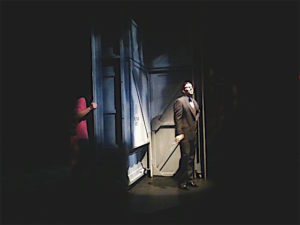 By now I am little more than a privileged bystander, a member of the audience with the best seat in the house, directly behind Bill Hayes, the director, and Paul Black, the lighting designer. I made my final revisions to the script on Saturday night, nipping out on the spot a half-page of superfluous dialogue, after which I put Billy and Me in the hands of my collaborators. From time to time I whisper suggestions to Bill, but mostly I’m content to sit and watch my script being transformed into Palm Beach Dramaworks’ production, learning lessons that I’ll put to use the next time I direct a play, whether by myself or somebody else. If there’s a better place to be, I’m damned if I know what it is.
By now I am little more than a privileged bystander, a member of the audience with the best seat in the house, directly behind Bill Hayes, the director, and Paul Black, the lighting designer. I made my final revisions to the script on Saturday night, nipping out on the spot a half-page of superfluous dialogue, after which I put Billy and Me in the hands of my collaborators. From time to time I whisper suggestions to Bill, but mostly I’m content to sit and watch my script being transformed into Palm Beach Dramaworks’ production, learning lessons that I’ll put to use the next time I direct a play, whether by myself or somebody else. If there’s a better place to be, I’m damned if I know what it is.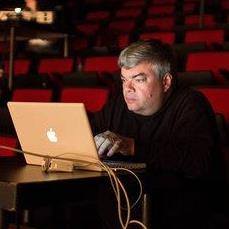 So how do I feel now, five days before opening night? Quite surprisingly calm. I like my play, and I love Bill’s staging of it. No doubt there are plenty of things that I will do differently should I ever get the chance to direct Billy and Me in the future, but right now I can neither see nor hear them. What is taking shape on stage is the play I meant to write, the story of two talented but troubled men who are trying to come to terms with what they are and what they’re meant to do with their lives. The results are more ambitious than Satchmo—one more act, two more actors—but not extravagantly so. I feel like I’ve taken a step of appropriate size toward…what? More playwriting, I certainly hope, for there are other stories I want to tell on stage.
So how do I feel now, five days before opening night? Quite surprisingly calm. I like my play, and I love Bill’s staging of it. No doubt there are plenty of things that I will do differently should I ever get the chance to direct Billy and Me in the future, but right now I can neither see nor hear them. What is taking shape on stage is the play I meant to write, the story of two talented but troubled men who are trying to come to terms with what they are and what they’re meant to do with their lives. The results are more ambitious than Satchmo—one more act, two more actors—but not extravagantly so. I feel like I’ve taken a step of appropriate size toward…what? More playwriting, I certainly hope, for there are other stories I want to tell on stage.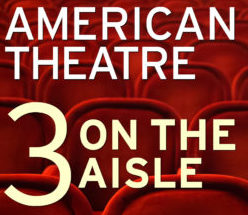 The third episode of Three on the Aisle, the new podcast in which Peter Marks, Elisabeth Vincentelli, and I talk about theater in America, is now available on line for listening or downloading.
The third episode of Three on the Aisle, the new podcast in which Peter Marks, Elisabeth Vincentelli, and I talk about theater in America, is now available on line for listening or downloading.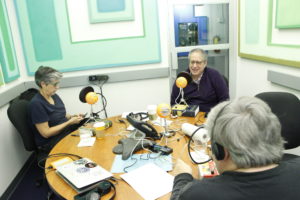 We also talk about how the continuing sexual-harassment scandals have started to affect American theater, followed by a segment in which I discuss my experiences writing Billy and Me, my second play, which opens on Friday at
We also talk about how the continuing sexual-harassment scandals have started to affect American theater, followed by a segment in which I discuss my experiences writing Billy and Me, my second play, which opens on Friday at